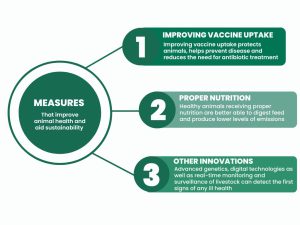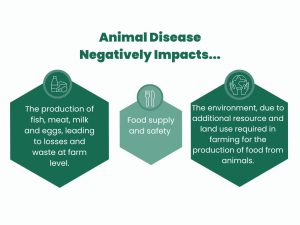Back to Topics
NOAH sustainability strategy
- Introduction
- Sustainability Vision
- Animal health and sustainability – societal value of veterinary medicines industry
- The value of the animal health industry in meeting challenges
- The UK animal health industry and sustainability -what steps do companies take?
- Conclusion
Introduction
Wider society, governments and businesses all have a raised awareness of the need for a sustainable approach to the use of resources. Individuals and businesses all have a responsibility to contribute to a sustainable future. For the animal health industry, the key focus is producing veterinary medicines, and other products and services that protect animal health and welfare, and through that our own health and that of the planet we share. Our industry contributes to the three pillars of sustainability: social, economic, and environmental.
In 2015 the United Nations adopted 17 Sustainable Development Goals (SDGs) as part of the ‘2030 Agenda for Sustainable Development’. This agenda includes actions to be carried out at national level to protect our planet, people, and animals. The animal health industry can help drive delivery of these goals1. The animal health industry’s focus on science and innovation for animal health goes hand-in-hand with a focus on protection of animal and human health, the environment and contributes to sustainable food production.
Sustainability Vision
The sustainability vision of the animal health industry is ensuring availability of veterinary medicines and animal health products, ensuring protection of animal health and welfare, human health and the environment, with veterinary medicines and other animal health products being manufactured, distributed and used in a sustainable manner.
Animal health and sustainability- societal value of veterinary medicines industry
Healthy animals play an essential role in achieving societal sustainability goals, as healthier animals need less feed, water, medicines, and land to produce enough food for us.

NOAH members are developing technologies that can improve animal health further and can, with the right policies and partnerships, save time and input resources meeting our nutritional needs while helping reduce emissions by almost a third2.
As well as having an adverse impact on animal health and welfare, animal disease leads to inefficient production of food from animals leading to a greater use of resources than should be necessary.

Sustainability challenges in animal health require a true One Health approach, recognising that the health of people is closely connected to the health of animals and our shared environment. Protecting animal health contributes to the protection of human and environmental health and the production of food from animals in a sustainable manner.
The value of the animal health industry in meeting challenges
The animal health industry is committed to maintaining a balance in the relationship between animals, people, and the environment. Ultimately, NOAH members and their products help farmers to raise animals in an environmentally sustainable way, with high standards of animal health and welfare.
Animal well-being
Good animal health is a prerequisite for high standards of animal welfare. Preventing illness and keeping animals healthy also results in a reduced need for treatments with antibiotics if they become ill. Regular veterinary care helps ensure better well-being overall, for the livestock on our farms and companion animals in our homes.
Circular resource efficiency
Livestock make efficient use of crop by-products with 86% of animal feed made up of materials inedible by people 2. Not only are they great up-cyclers, but healthy animals are efficient resource-users as they require less feed and water to produce fish, meat, milk & eggs.
Climate care & reduced pollution
With less resources needed, well-managed animals can mean a 30% decrease in emissions3. Healthy animals being well-cared for is a goal that must be achieved for optimal animal welfare. Furthermore, they and their produce have a smaller environmental footprint when they are healthy and well cared for.
Preserving ecosystems
Better animal health management means farmers can produce enough food on existing farmland, while preserving surrounding lands and biodiversity. With animal health covered, extra attention can be given to environmental stewardship.
The UK animal health industry and sustainability – what steps do companies take?
Sustainable research
NOAH member companies are committed to advancing the 3Rs (reduce, replace and refine) in animal research. Members promote transparency and adherence to Good Laboratory Practices. They advocate high animal welfare standards for animal research facilities, and a code of conduct through the European Animal Research Association (EARA). NOAH also advocates regional and global efforts towards regulatory convergence which helps to prevent duplication of testing requirements.
Sustainable sourcing
NOAH member companies ensure providers adhere to strict criteria for sourcing which respects local communities and biodiversity in compliance with the Nagoya Protocol Convention on Biological Diversity.
Sustainable manufacturing
NOAH member companies’ products frequently depend on manufacturing sites outside of the UK. Within these manufacturing sites, adherence to Good Manufacturing Practices is a legal requirement that our members fully support and adhere to. Our members continue to make sustained efforts to reduce emissions from production plants and use green energy where possible.
Sustainable regulation
Before being placed on the market, all veterinary medicines undergo a rigorous regulatory assessment by independent regulators, who consider the balance of the benefits provided from using the product, compared with the potential risks. This benefit/risk assessment considers the product’s safety (including environmental safety), quality and efficacy, and determines the product’s legal supply classification (who can prescribe/supply) together with any warnings to be placed on the packaging or restrictions that should be placed on the product’s use.
Furthermore, both NOAH members and the regulatory authorities keep the safety of products under review with new scientific evidence being considered as it becomes available. This ensures that regulatory authorities and animal health companies can monitor and establish if the benefit/risk balance of products changes, so that required changes can be made to product licences if necessary.
Sustainable packaging
The packaging of veterinary medicines is strictly regulated so that regulatory authorities are satisfied that prescribers and end users of licensed veterinary medicines have access to the required information about indications for use of products and any safety information or contraindications. In this context, animal health companies are limited in what they can do to speedily reduce or amend product packaging.
However, the legislation that regulates veterinary medicines in the UK will be changing in the coming years and the animal health industry will be encouraging the regulatory authorities to allow for the provision of some information potentially online, rather than hard print copies being a requirement. With this anticipated change in the legislation, it may be feasible to reduce the amount of packaging around individual medicines by provision of some information online, and NOAH is encouraging the regulatory authority to consider this option. Such a measure could help to minimise packaging material and eventual waste.
Sustainable, responsible use and disposal
NOAH member companies actively participate in a multitude of awareness programmes, for example RUMA (the Responsible Use of Medicines in Agriculture Alliance), to promote the responsible use of all medicines. NOAH also promotes good stock management practices by prescribers and sellers of veterinary medicines to avoid expiry and waste where possible and adherence to local authority guidelines for the correct disposal of products and containers4.
Sustainable business conduct
NOAH member companies are actively working to implement sustainable materials, sourcing and energy use where possible, and support investments in local communities. Member companies invest in the future of the animal health industry, with an estimated 8% of turnover being re-invested in innovative research to provide solutions to current and future disease challenges.
The provision of promotional material is an important way in which animal health companies can update prescribers and end users about the features and indications for use of new (and changes to existing) products. However, the provision of brochures, flyers etc can generate waste. NOAH members commit to the provision of concise brochures and flyers, in order to reduce the volume of printed material and are actively working to source sustainable materials in the production of these. At congresses, trade shows, CPD events, vet practice/SQP premises visits etc, NOAH members will commit to minimising the amount of promotional material issued to delegates and will work towards the provision of as much material as possible through electronic or sustainable means.
NOAH members will carefully consider the environmental impact of their staff during the conduct of their duties, with moves towards greater use of electric/hybrid vehicles for field-based staff and continued use of virtual meetings in the future, with the corresponding reduction in travel related emissions that this entails.
Conclusion
Many NOAH member companies operate nationally, regionally and at a global level supporting veterinarians, farmers, and all other animal owners around the world. The animal health industry makes an important contribution to global sustainability, particularly in those areas of the world that depend heavily on animals for their livelihood. Better animal health contributes to at least 10 of the 17 Sustainable Development Goals 1. The world faces significant challenges, and the animal health industry is playing an essential role in providing solutions to meet these challenges.
References
- UNESCO and Sustainable Development Goals: https://en.unesco.org/sustainabledevelopmentgoals
- Future of EU Livestock: https://op.europa.eu/en/publication-detail/-/publication/b10852e8-0c33-11eb-bc07-01aa75ed71a1/%20language-en
- Harnessing the power of livestock to drive sustainable development, FAO: https://www.fao.org/news/story/en/item/1157729/icode/
- European Platform for the Responsible Use of Medicines in Animals: https://epruma.eu/wp-content/uploads/2022/02/FACTSHEET_PharmaceuticalWasteDisposal.pdf